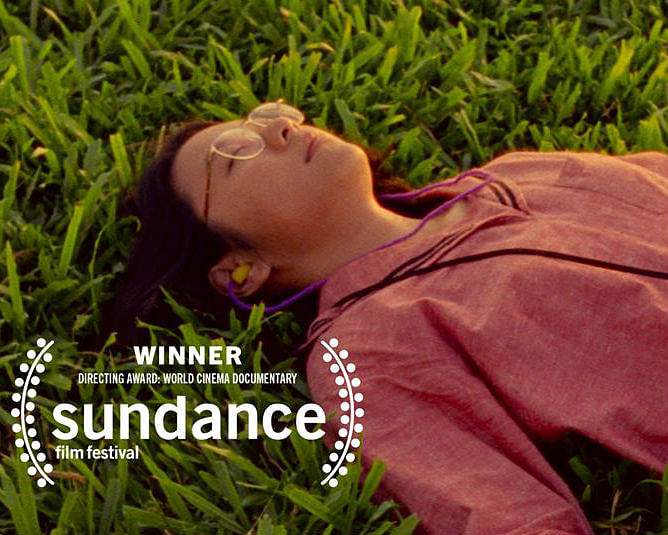
Photo credit: facebook.com/shirkersfilm
“It’s a story that screams to be told – I would be a loser if I kept this film in the basement and didn’t do anything about it,” Sandi Tan exclaims over the phone from Los Angeles, where she’s based. “It would mean something to me, Singapore and the rest of the world to share this story, and to tell people not to be afraid if something bad happens to you or your work.” And Sandi, 46, has good reason not to be afraid.
She’s coming off the back of a successful run of her internationally acclaimed documentary, Shirkers. Not only has it nabbed the World Cinema Documentary Directing Award at Sundance Film Festival (making her the second Singaporean filmmaker after Pop Eye’s Kirsten Tan – Her World 2017 Young Woman Achiever recipient – to gain recognition at the festival), Shirkers has been acquired by Netflix for global distribution on 26 October.
It’s a Singaporean story you couldn’t make up: Girl grows up in a city that’s as small as her dreams are big. Girl meets a strange American (or is he?) man in Singapore who becomes her mentor in all things filmmaking. Girl, only 19, writes a screenplay called Shirkers. He tells her it’s brilliant, encourages her to make the film, and acts as the director.
With the help of fellow film enthusiasts, she and her best friends spend their entire 1992 university summer break acting, shooting, producing what would have been Singapore’s first indie film (three years ahead of Eric Khoo’s Mee Pok Man). The young adults return to university abroad, buoyed by their achievement, with reassurances from the mysterious American that he would, in their absence, get going with the footage.They would never see him, or their film again.

Photo credit: facebook.com/shirkersfilm
The girl is Sandi, and, 25 years after the incident happened, it’s time to tell this stranger than fiction tale on her own terms. Shirkers is a film about a non-film, a haunting, idiosyncratic retelling of her experience with Georges Cardona, a man who claimed he was the inspiration for the protagonist of Sex, Lies and Videotapes, and who eventually made off with their footage. The documentary, interspersed by the now recovered footage (no spoilers here: you have to watch to find out how) follows Sandi as she revisits her teenage years, speaks to her original crew and friends of Georges, and realises, with the power of retrospection, that there was more to the missing film than her teenage self understood. Yes, it is every bit as meta as we’ve described it.
The original Shirkers was offbeat, hipster before it was hip, and ahead of its time. “It’s a strange Valentine to Singapore back then,” muses Sandi, 46. “I didn’t want to show skyscrapers, palm trees, or a single textbook. I wanted to show a distinct, unique collection of faces and places that I loved, like back alleys, farms, my favourite buildings.” The result was a road movie featuring an 18 year old, S, who roams around Singapore killing people and having misadventures. You have to see it to believe it.
For Singaporeans, watching this love letter to our city in the 90s is incredibly nostalgic. But beyond that is a more universal, emotional message – of re-examining a childhood with new eyes, of reliving dreams, and the excitement of creating new things. The film may be brimming with sentiment and the voiceover wistful, but Sandi, as I could tell from the L.A phone call, is matter-of-fact and sanguine. The same fearless girl who bulldozed her way to getting her maiden film made is now living in LA and in the early stages of talks to create more films.
Most 19 year olds would balk at the idea of creating an entire feature film from scratch – especially in the pre-Internet era. But for Sandi, who grew up in a family of film buffs and whose step-mother was the famous Marrie Lim of They Call Her Cleopatra Wong fame, it was the ultimate goal.
“Film captivated me because it was a way one viewed the world,” she explains. “I couldn’t watch all the movies I wanted in Singapore so I used to read movie guides, memorise synopses, and imagine what the movies were like.” Beguiled by the power of storytelling, and noticing that “there were no films made about my world,” she decided to act on it.
A university student studying in the United Kingdom, she drew inspiration on an American road trip to write Shirkers. Her best friends Jasmine Ng (now a filmmaker) and Sophia Siddique Harvey (now the Head of Film at Vassar College) would be instrumental in producing the film.
It was a wildly ambitious project helmed by teenagers, but the team powered through with youthful single-mindedness. “Everything then was censored. In order to be creative you had to make your own rules. You had to make things happen,” says Sandi. “No one had done something like this before, there was no one to tell us no.” Case in point: when they wanted to draw crowds for a scene, one of the crew members faked a seizure. In contrast, Georges was on the sidelines, relying on the girls to do the grunt work.
When it became clear that Georges had stolen their film, Sandi was devastated, but not defeated. “I don’t see it as a cautionary tale. I’m a pessimist, so I assume everyone is devious,” she quips. “His actions were so uniquely malevolent that you don’t think it would happen again.” Leaving the film industry was never an option – she went on to become a film critic with The Straits Times, before moving to the States.
Her 2001 short films Moveable Feast and Gourmet Baby would become film festival favourites, and her 2012 novel The Black Isle a bestselling title. And in the way that life is, when the lost footage were returned to her in 2012 (again, you have to watch the docu to find find how and why), she realised that this was the ultimate form of redemption.
In the eight months she took to edit the film, Sandi says she was able to look back on what happened with wiser, more experienced eyes. “Back then, we were embarrassed that we let ourselves be conned, so we didn’t talk about it or deal with it,” she explains. “But then when you look back and see it as a grown up, you think, wow, we did that? You realise that we did something amazing. I’m proud of what my friends and I tried to do.”
Shirkers has been making its run on the film circuit, and Sandi has had the privilege of people coming up to her after movie screenings to thank her for sharing this story. “The film speaks to a lot of people personally – they feel like it is their story,” she explains. “Everyone who’s creatively inclined has some version of this story, or remembers what it’s like to be young and think everything is possible.” But thanks to Netflix, Shirkers’ reach has extended to include an entirely different audience.
“It’s also a very personal, earbuds movie,” she explains. “I look forward to kids living in unlikely places in Vietnam or Croatia who want to do things, who can now watch it and have me talking in their ear and telling them not to be afraid. And to go forth, and pursue things.”
ALSO READ: HER WORLD YOUNG WOMAN ACHIEVER KIRSTEN TAN’S FILM MAKES IT TO THE OSCARS
This was first published in the November issue of our magazine.

